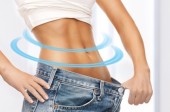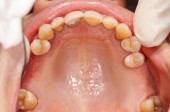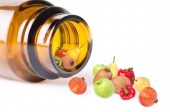Search Podcasts
Belly fat can be one of the most stubborn places to lose weight.
Additional Info
- Segment Number 2
- Audio File healthy_talk/1515ht5b.mp3
- Organization Life Extension
- Guest Website Healthy Talk MD
-
Transcription
RadioMD Presents: Healthy Talk | Original Air Date: April 10, 2015
Host: Michael Smith, MD
Anti-aging and disease prevention radio is right here on RadioMD. Here's author, blogger, lecturer and national medical media personality, Dr. Michael Smith, MD, with Healthy Talk.
DR. MIKE: So, tonight, when I enjoy a nice glass of California red wine, I might burn some fat? Wouldn't that be nice? Come on, now. Let's hold on. I've said this before. There are no miracles. Come on. You've got to exercise. You've got to eat less. We've got to be more active. We've got to eat healthier. You know? Personally, I do well with several small meals throughout the day, but it's nice to see some research pointing to the fact that some of these other adult things we do can be quite helpful. In this case, it's red wine.
Now, that's one glass for women, two glasses for men. I'm not making that up. You know, I'm not saying that because I'm a man I get to drink more. I'm not saying that. Alcoholic beverages—it's been shown that cardiovascular benefit, the overall health benefits, which does come a little bit just from the alcohol, the ethanol, ETOH, ethanol, it's one serving, which is like a beer, a glass of wine, a shot of hard liquor for women and two for men. I mean, that's what we've shown. If you start doing more than that, you get a diminished return.
So, maybe two for women, three for men. How's that? Something like that. I don't know. Okay. So, drinking red wine. I mean, this is what was interesting, too. It's not just the red wine. Even grape juice. Of course, be careful. There are a lot of sugars—a lot of added sugars to grape juice. The point of this study was grapes are really good for us. Even fermented grapes. Even grapes that have been turned into a thing called grape juice. It's the grapes—it's these compounds, antioxidants, in the grapes--the pulp and the skin, they're just great for you. The seed. The grape seed is wonderful for us.
Now, in this case, it's really about the pulp or the skin, but drinking red wine or even grape juice could help overweight people burn body fat as well as improve their overall health according to a new study. The findings suggest that consuming dark colored grapes—and that's true. That's where most of these studies are pointing towards. It's the dark colored grapes, okay? Whether eating them or drinking juice or wine might help people better manage obesity and related metabolic disorders such as fatty liver, which I also found interesting.
Now, this research was done out of Oregon State University where they first exposed human liver and fat cells grown in the lab to extracts of four chemicals found in these dark red grapes. These grapes were native to a variety of grapes, actually, native to the Southeastern United States, even though this was done over in Oregon. One of the chemicals, ellagic acid, proved particularly potent. It dramatically slowed the growth of existing fat cells and the formation of new ones and it boosted metabolism of fatty acids in liver cells. The researchers, then, followed that up by following a group of mice on a diet consisting of about 10% fat and another group, on a diet made up of about 60% fat.
So, taking this first, you know, lab cell culture study. So, they had some liver cells. They isolated 4 key compounds, one of them ellagic acid from dark red grapes from the Southeast. They applied those antioxidants to the petri dishes and there was a decrease in the number and size of fat cells. There was just an increase in fatty acid metabolism. So, that's all good. So, they took that so they had kind of a proof of concept now and they went to the animal model and that's kind of the way you do things. You start in the lab and the animal model and, eventually, humans. So now, they're going to the animal model, which is mice and they make great human models. They fed some of the mice a diet consisting of about 10% fat. That's pretty low. Most humans would not like that. Then, another group, about 60% fat.
I think most of us would like to be in that second group. It's funny, Neil Shay, who is a biochemist who was part of the research. I guess he was the one taking care of the mice at Oregon State University. He actually said, "Our mice like that high fat diet. They overconsume it," is what he said. So, they're a good model for the sedentary person who eats too much snack food and doesn't get much exercise. Yes. I would agree with you Neil Shay.
So, over a period of 10 weeks, the high fat diet mice developed fatty liver, pre-diabetes and even diabetic symptoms, but a select group of that high-fat diet received grape extracts, again, focused on those four key compounds, ellagic acid being the main one. They were given about 1 ½ cups of grapes a day for humans. That's not that bad, right? One and a half cups—I mean, that's maybe a handful or two? I guess it depends on the size of these grapes. So, what they found was this high-fat diet group of mice, remember, they were given these grapes. They accumulated less fat in their livers and had lower blood sugar than those who didn't get the grapes.
So, that's great. I mean, there's a great animal model further confirming the proof of concept that was developed in the cell culture study. The researchers also observed higher levels of proteins that metabolize fat and sugar in the mice that were given red grape extract. So, there's just an overall improvement of fatty acid metabolism. I mean, that's kind of the conclusion here. There are these key compounds, these key antioxidants in dark colored, in this case, red grapes. One, in particular, called ellagic acid, is just improving how the cells in the cell culture study and the mice in the mice study—the animal model study—are metabolizing fats. There's an improvement. Okay.
That's the take home message from this study. By the way, this study was published in the January issue of the Journal of Nutritional Biochemistry. Now, okay. This same researcher, Neil Shay, who talked about the mice liking the fat diet, he goes on to say, "Listen, unfortunately, these plant chemicals are not a weight loss miracle." Awesome. I agree. "We didn't find, and we didn't expect to, that these compounds would improve body weight," he said. "But, by boosting the burning of fat, especially in the liver, they may improve liver function in overweight people. If we could develop a dietary strategy for reducing the harmful accumulation of fat in the liver using common foods like grapes," Shay said, "That would be good news." That's what I really liked about this study was this conclusion.
Red grapes, in and of themselves, are not a weight loss product. So, if you hear a doctor on TV or another doctor on the radio talking about the miracle of the red grape, the next fat burner, no, no, no. What we are learning, though, is there are key compounds in this skin and pulp of, in particular, red grapes—dark colored grapes—that improve fatty acid metabolism, specifically in the liver. When you apply that, then, to a healthy diet and exercise program, then with the improvement of fatty acid metabolism, we could see additional weight loss. That's how this, what I just said, we should write that down because that's how a study like this should be presented in mainstream media. Not a miracle fat burner, but simply something that could aid somebody who is obese or overweight in their weight loss efforts by improving fatty acid metabolism.
Some other researchers went on to say, "We are trying to validate the specific contributions of certain foods for healthy benefits. If you're out food shopping and you know a certain kind of fruit is good for a health condition, wouldn't you want to buy that fruit? Or, maybe the red wine?" So, red wine, grape juice, eating the grape, right? Eating the red, dark colored grape does offer benefits to fatty acid metabolism, specifically in the liver.
So, this cell culture study and this animal model confirming that cell culture study? Proof of concept. Now, we need to study this in humans, specifically the ellagic acid.
This is Healthy Talk on RadioMD. I'm Dr. Mike. Stay well. - Length (mins) 10
- Waiver Received No
- Internal Notes NO GUEST
- Host Mike Smith, MD
Folic acid is an essential B vitamin that has many benefits.
Additional Info
- Segment Number 1
- Audio File healthy_talk/1515ht5a.mp3
- Organization Life Extension
- Guest Website Healthy Talk MD
- Length (mins) 10
- Waiver Received No
- Internal Notes NO GUEST
- Host Mike Smith, MD
Listen in as Dr. Mike provides the answers to a wealth of health and wellness questions.
Additional Info
- Segment Number 5
- Audio File healthy_talk/1515ht2e.mp3
- Organization Life Extension
- Guest Website Healthy Talk MD
-
Transcription
RadioMD Presents: Healthy Talk | Original Air Date: April 7, 2015
Host: Michael Smith, MD
RadioMD. It's time to ask Dr. Mike. Do you have a question about your health? Dr. Mike can answer your questions. Just email AskDrMikeSmith@RadioMD.com or call now: 877-711-5211. The lines are open.
DR MIKE: Alright that's AskDrMikesmith@RadioMD.com. As you guys know, I love this part of the show. I love answering questions even when I don't know the answer all the time. But I just love the research behind it and the thought and the theories. It's cool stuff, so please send me your questions and you can be as detailed or as vague as you want. You can be anonymous or you can give me your name it's all up to you.
I have a question about a new prostate cancer test using gold nanoparticles and I'm going to get to that but I noticed another question I'm going to start with because I think I can answer this one pretty quick and then move into the prostate cancer test which may take a little bit more time. So , let me go to this shorter question here:
"I had a procedure done where my doctor unclogged the arteries in my lower extremities. It's been 6 months since the procedure and I still can't walk without pain. Do you have any suggestions?"
So, yes. This is an example of an anonymous email. I didn't print out the full email. I don't see the email or the name I just have the question. Sometimes, I print it out where I can see the email. I just did one with Ralph Bennett and I know that because it's at the top. But, anyway, if you don't want your name said, just tell me or whatever I'll work with you. But, yes, so just like the arteries in your heart can get clogged, any artery in your body anywhere can get clogged and the lower extremity actually is very common.
If you ever walk and you start getting kind of like a pain a cramping of the calf muscle that kind of thing, that's usually a good sign that there's some blood flow issues probably from some blocked arteries. When I was in radiology, I used to do a lot of these lower extremity angiograms. I remember being a resident I did my interventional radiology part at the VA in Dallas. As a matter of fact, I was in the middle of a procedure just like this when 9/11 happened, I remember that.
How could you forget that day? I was literally doing a lower extremity angiogram as a resident. Anyway, so the best way to answer this: you're still having pain when you walk and it's been 6 months. So, I actually would recommend two things: first get a blood test called PLAC its abbreviated for phospholipase AC. It's an enzyme that the higher it is, and I think the number we use at Life Extension is 200, so when it's over 200, that's a bad sign. That means this enzyme is in there kind of chewing up the fat and stuff. Even if they put stints in, you still have some plaque in there and you have this enzyme kind of eating away at it and it makes the stint unstable. So, if you're still having pain after 6 months I would start with the phospholipase test the plaque test. If it's over 200, then you definitely need to go ahead and have another angiogram of your lower extremities to make sure that the stint's doing what its supposed to do.
However, you could also make the case that maybe you should just have the angiogram; forget the PLAC--just go ahead and have the angiogram. Let's make sure that the stint that they most likely placed is okay and still working. If it is and everything looks fine and you're still not getting the benefit that you were expecting from the procedure, well, I mean, I think other options would be to strengthen the artery. I mean we've talked on my show before about the importance of endothelial cells so things like pomegranate, curcumin, resveratrol, CoQ10--these are all nutrients that can really help artery health so maybe that's where you need to focus.
Alright, let's go to the next question. This is about a new prostate cancer test that is pretty interesting.
"I live in South Florida and saw on a local news story about a new prostate cancer test using gold. Have you heard about it?"
I didn't. I had to look this up. I found this from Eurasia Review, it's a news outlet and we actually published this on the Life Extension website. We do a daily news at Life Extension. So, I found this on Life Extension but it was from Eurasia Review and it was published just this month and so this is like right off the press. Hot off the press.
It turns out that there is a test that costs less than a dollar and it yields results in minutes and has been shown in newly published studies to be more sensitive and more exact than the current standard test for early stage prostate cancer, which, of course, is the PSA test, prostate specific antigen. The PSA is a test that we use and it's good. It's not a bad test. It's not very sensitive for prostate cancer is the problem. PSA can go up even just when there's prostatitis, infectious or non-infectious, just enlarged prostate as men get older. I mean PSA can go up. It doesn't mean it's cancer.
So, what's happened is, if you rely only on a PSA a lot of guys end up having these biopsies that they just don't need. So, we're always trying to figure out a better way, a more sensitive way of identifying cancer versus non-cancer prostate issues. This is apparently one that can and this was developed at the University of Central Florida.
A scientist named, I'm going to say the name wrong, Qun Treen, holds the promise of earlier detection. I'm sorry. She developed this test and the test holds the promise of earlier detection of one of the deadliest cancers among men. It would also reduce the unnecessary invasive biopsies stemming from the less precise PSA test that's now used. So basically, what she's developed out of the University of Central Florida are gold nanoparticles. Here's what happens: when a tumor develops, the body mobilizes the immune system to produce antibodies and this test, this gold nanoparticle is detecting the immune response.
Not necessarily the cancer itself, but it's finding these antibodies to the cancer. And what it's doing is the gold nanoparticles, when applied to the person's blood is able to attract all of these antibodies better. It's like a vacuum for these antibodies and it highlights underneath the microscope the antibodies better than looking for the cancer itself. It's able to identify, apparently, according to what I'm reading here, it's able to identify a cancer way before PSA would even begin to increase.
So, it's a very sensitive way of finding prostate cancer but it's not really finding the cancer it appears to be identifying the antibodies to the cancer and those antibodies are attaching to the gold nanoparticles. Although and I'm reading further in this report, and although it uses gold everybody thinks, "Oh my gosh, the test is cheap." That's good right? A small bottle of nanoparticles suspended in water costs about $250 and yet it contains enough for about 2500 tests. That's where you're getting about the $1 a test.
So even though it' gold, its very cost efficient. "What's different and unique about our technique," this is Dr. Huo explaining this, "what's different and unique about our technique it's a very simple process and the material required for the test is less than $1 and because it's low cost we're hoping most people can have this test in their doctor's office. If we can catch this cancer in the early stages the impact going to be big." And of course, that's one of the reasons we're seeing cancer deaths go down is we're catching cancers earlier and treatment has a better chance of working. And, of course, this is bypassing the PSA which is not that sensitive.
This is actually looking for the antibodies that are attaching to the cancer. So, you only make those antibodies when there's cancer so that's why this is a highly sensitive test for prostate cancer and, apparently, it's able to detect these antibodies when there's just a few of them. So, a lot of promise with the gold nanoparticles for prostate cancer detection. It's awesome.
This is Healthy Talk on RadioMD. I'm Dr. Mike, stay well. - Length (mins) 10
- Waiver Received No
- Internal Notes NO GUEST
- Host Mike Smith, MD
Listen in as Dr. Mike provides the answers to a wealth of health and wellness questions.
Additional Info
- Segment Number 4
- Audio File healthy_talk/1515ht2d.mp3
- Organization Life Extension
- Guest Website Healthy Talk MD
-
Transcription
RadioMD Presents: Healthy Talk | Original Air Date: April 7, 2015
Host: Michael Smith, MD
You're listening to RadioMD. It's time to ask Dr. Mike on Healthy Talk. Call or email to ask your questions now. Email AskDrMikeSmith@RadioMD.com or call 877-711-5211. The lines are open.
DR. MIKE: So, my first question came in just last night and I thought this was important that I share this with you and, hopefully, I can help Mark feel a little bit better about the supplement industry. The question is:
"I understand that some weight loss products were found to contain amphetamines. Why should we believe anything coming out of the supplement industry? Disgusted, Mark."
Yes. Okay, so I wasn't aware of what Mark was referring to so, again, working at Life Extension I have a whole staff of health advisors that can help me and so I reached out to a couple of them and they were able to find...and I'm assuming this, I'm not really sure where Mark read this from or where you got the information from, but you are correct. There was just this month, April, there was a publication online in Drug Testing and Analysis. It will eventually come out in their actual magazine but right now you can see this in this online Drug Testing and Analysis what they reported was 11 supposedly "all-natural" weight loss supplements contain BMPEA. And they are calling BMPEA a close chemical cousin to amphetamine and that makes sense.
I mean, amphetamines is really more of like a class of drugs. There are many compounds in nature that are also just made up in a lab that can mimic amphetamine and give you a nice little boost of energy and decrease appetite and all that kind of stuff, which is why you're finding this compound in some of these weight loss products. The products all list a Texas shrub also known as blackbrush on their labels.
I guess the researchers are connecting this. I guess the manufacturers are hiding the amphetamine within this blackbrush because the thought process was this Texas shrub, blackbrush, contains naturally BMPEA. So, if you put it in the product and somebody from the FDA or the government or researchers go in and test and they find BMPEA, this amphetamine cousin, you could blame it on the blackbrush. As a matter of fact, it's natural. That's why we put it in there. You get a little amphetamine like rush and your appetite comes down. But it's safe. It's natural. But here's the problem with all this and I agree with you, Mark.
I find this disgusting. Blackbrush has never been shown to contain any kind of amphetamine cousin of any kind. And so the manufacturers, whoever told them that, they were lied to. So, they added a little bit of this Texas shrub into their product and they purposefully adulterated those products with straightforward information right from a lab probably BMPEA (this amphetamine cousin) knowing that they could just blame it on the blackbrush. Of course, the product works great because it's amphetamine-like, so people have energy and they have no appetite. So, they lose weight and they feel good and they're concentrating better and they love it. They make millions of millions, if not billions of dollars.
So, yes, it is a little disgusting and as I said blackbrush in nature really contains no BMPEA or any amphetamine like cousin. So, they didn't even get it right if they were trying to fake people out, they didn't even do it right. So, you're right, Mark, that is disgusting and I fully believe and these companies that are producing these types of products need to be prosecuted to the full extent of the law. Period. The FDA should be involved the FTC should be involved absolutely.
And it angers me because it upsets people like you, Mark, and you know have this bad taste in your mouth of the supplement industry. But, let me encourage you, Mark, that the supplement industry is a big industry. And there are companies, many of them, who have been in this industry for a long time and they take quality and purity and potency very, very seriously. And it's terrible that this kind of stuff happens. And I don't know the rest of the story at this point I'm just giving you what we know at this point. Where this goes I don't know, but, Mark, you're right. This is not good news for the industry. This hurts us, but your question, "Why should we believe anything coming out of the supplement industry?" Let's not let a couple bad apples ruin the whole batch.
I mean, that's a cliché but it's true. I stand by what I said. I work for one. I can tell you the company I work for. I wouldn't be the Senior Scientist if I didn't believe in the quality of the products that we produce and the science that we use the back them up. And I stand by that and of course we've been around for 30 some odd, 35 years. And we're not the only one. There are solid, awesome companies out there doing the right thing producing good products, so I don't know what else to say. Again, you can read that full report online Drug Testing and Analysis it was just published this past month.
Okay moving on next question this is from Ralph. Ralph says:
"Hi I love your show."
Thank you, Ralph, I appreciate that.
"I tried taking 500 mg of curcumin. After two weeks, I noticed lower back muscle and joint pain. It did help with anxiety, though. Many of the symptoms were similar to statins and niacin, which I also cannot take in significant doses."
He goes on to tell me he's 50; he works out really hard. He has a pretty tough work schedule. There's a strong family history of heart disease in his dad and his brother. Okay, so that's pretty much the gist of it.
So here we have Ralph trying to take curcumin, which I think you should. It's not one of my foundational products. That's the multivitamin, Omega-3 oils, CoQ10, and probiotic. But curcumin, if I was going to add another foundational product to my top four, curcumin would probably be right there. It would be in the running for that fifth coveted spot of Dr. Mike's foundational supplements. Don't give up on the curcumin, Ralph. You know, the first thing I notice here is you say 500 mg of curcumin and that tells me most likely you're not doing the right form of curcumin. No. no. I said that wrong. It's not form. You're not doing the best formulation of curcumin. The best trademarked formulation of curcumin is called BCM-95 and the appropriate dose of that in all the formulas is 400 mg.
So, the fact that you tell me you're doing 500 mg tells me you're doing another source of curcumin that I'm not familiar with and it's not the best one because it should say 400 mg. So, that's the first thing I would switch or make sure. Maybe you meant to write 400. I don't know but at the end of the day just make sure you're doing BCM-95 curcumin that's the curcumin that absorbs well. It's the curcumin that a vast majority of the research is done on and so that's the first thing and that's a clue that you tell me you're doing 500 mg.
It should be 400 mg. So make sure you're doing the right curcumin.
The other thing to remember to when you do, and this is for all my listeners, when you do a product and you don't respond well to it you get a headache you get a stomach issue, whatever side effects you feel from it, it's not always the active ingredient, in this case, curcumin. Sometimes, it's the inactive ingredients that might be in the product. So, I always encourage people not to give up on the active ingredient. Don't give up on curcumin yet, Ralph. Maybe you just need to find another one. Find one that has some different inactive ingredients what are called excipients. You may be reacting to one of those and not the curcumin. So, don't give up. Make sure you're doing BCM-95 Try a different product, different excipients and see if that helps.
This is Healthy Talk on RadioMD. I'm Dr. Mike. Stay well. - Length (mins) 10
- Waiver Received No
- Internal Notes NO GUEST
- Host Mike Smith, MD
Treatment for gum disease can vary depending on how severe your case is.
Additional Info
- Segment Number 3
- Audio File healthy_talk/1515ht2c.mp3
- Featured Speaker Robert H. Gregg II, DDS
- Organization LANAP
-
Guest Bio
 Dr. Robert Gregg is a former faculty member at UCLA School of Dentistry, Section of Hospital Dentistry.
Dr. Robert Gregg is a former faculty member at UCLA School of Dentistry, Section of Hospital Dentistry.
He has been using lasers clinically since August 1990, including CO2, free-running pulsed (FRP) Nd:YAG, both single- and variable-pulsed; FRP Ho:YAG, surgical Argon, CW Diodes, and Er:YAG. He has given lectures nationally and internationally on the subject of clinical laser applications.
Dr. Gregg is a co-developer of the FDA-cleared PerioLase® MVP-7™ pulsed Nd:YAG laser, and is a co-developer and patent holder of the LANAP® laser periodontitis treatment. He maintains a group private practice where he sees patients. - Length (mins) 10
- Waiver Received No
- Host Mike Smith, MD
Why is gum disease awareness so important?
Additional Info
- Segment Number 2
- Audio File healthy_talk/1515ht2b.mp3
- Featured Speaker Robert H. Gregg II, DDS
- Organization LANAP
-
Guest Bio
 Dr. Robert Gregg is a former faculty member at UCLA School of Dentistry, Section of Hospital Dentistry.
Dr. Robert Gregg is a former faculty member at UCLA School of Dentistry, Section of Hospital Dentistry.
He has been using lasers clinically since August 1990, including CO2, free-running pulsed (FRP) Nd:YAG, both single- and variable-pulsed; FRP Ho:YAG, surgical Argon, CW Diodes, and Er:YAG. He has given lectures nationally and internationally on the subject of clinical laser applications.
Dr. Gregg is a co-developer of the FDA-cleared PerioLase® MVP-7™ pulsed Nd:YAG laser, and is a co-developer and patent holder of the LANAP® laser periodontitis treatment. He maintains a group private practice where he sees patients. -
Transcription
RadioMD Presents: Healthy Talk | Original Air Date: April 7, 2015
Host: Michael Smith, MD
Healthy Talk with Dr. Michael Smith, MD. And now, here's the country doctor with the city education, Dr. Mike:
DR MIKE: So is there a new silent killer out there? I mean we all know blood pressure is kind of like the classic silent killer. I think most people are familiar with that. But my guest, who is Dr. Robert H. Gregg, he's the President and Chairman of the Board for Millennium Dental Technologies, Incorporated. He thinks there's another silent killer out there. Dr. Gregg is a former faculty member at UCLA School of Dentistry. He's been using lasers clinically since, gosh, August 1990, so he's really one of the pioneers here. He's given lectures nationally and internationally on the subject of clinical laser application. He is co-developer and patent holder on the LANAP® laser treatment.
Dr. Gregg, welcome to Healthy Talk.
DR GREGG: Good morning. Thank you. Good to be with you.
DR MIKE: So, what's this new silent killer that you think we need to know more about?
DR GREGG: Well, an interesting report was just published defining that fatal heart attacks are more associated with advanced gum disease and most people who survive heart attacks have less severe or no gum disease. And that's something new because we have heard about the connection between gum disease inflammatory markers and heart attacks, stroke, pre-term babies, low birth weight babies, Alzheimer's, pancreatic cancer, and the list goes on. But there's not been, there's only been an association between the various different systemic diseases periodontal diseases not a direct causation. They've now found a causation effect with the sudden death in advanced periodontal disease in someone who then has a heart attack.
DR MIKE: Yes. Dr. Gregg, are they linking this? I know we believe that there's this inflammatory component, but I guess in the mid 90's there was some work looking at certain infectious bacteria in the mouth that may be seeding some of the plaques. Where is that research?
DR GREGG: What we're finding out more and more about this very insidious germ called Porphyromonas gingivalis or P. gingivalis. It's anaerobic that is it's a germ that lives in the absence of oxygen and feeds and attacks the living cells and invades the living cells. But we're finding out that it isn't just isolated to the mouth, that it travels throughout the bloodstream and then lands on percolates through the heart vessel wall and other organs in their walls to lay and wait. They are opportunistic pathogens. That is, they wait for some other weakening of the patient's immune system to express themselves before they become active. So they can lay dormant. In fact we all have P. gingivalis in our mouths. It's not a foreign germ. It's a common germ that can be found. But it's whether or not there are other co-factors that can trigger it to become the nasty germ that it can be.
DR MIKE: What are some of those other co-factors then?
DR GREGG: Well, for example, smoking that depresses the immune system, specifically neutrophils, so that we can't fight off P. gingivalis should we decide to test the waters, so the speak. Diabetes and elevated A1C in diabetics also can change the permeability of the cells and, again, allowing a more hospitable environment for P. gingivalis to activate. So then, we also know that there's an inflammatory protein, C-reactive protein, that's also elevated in patients with diabetes and metabolic stress syndromes. It also has an impact and effect on activating P. gingivalis. So, you can just imagine if someone has a confluence or a number of these elevated markers that they're at high risk of activating P. gingivalis and with more advanced gum disease, they're more likely to have a large volume of P. gingivalis circulating in your system and lying in wait and that's where the trouble begins.
DR MIKE: So, Dr. Gregg, the question becomes for me, since we've moved away from just an association, we're now saying there's a cause effect link here so should cardiologists be treating gum disease now? Where do we go? I mean should we be looking at periodontal disease like we do blood pressure?
DR GREGG: Absolutely. So, in fact, I was speaking with a cardiologist not long ago and we were discussing the correlations which predate the causation that I'm now talking about and he was clueless to the information that I was talking about. He kind of got a little animated and said, "Well, this is why we need to talk more amongst our specialties," and, indeed, there has been some collaboration between the American Academy of Periodontology and the cardiologists. They have done some collaborative work and workshops looking at this. I am hearing and experiencing firsthand collaboration with cardiologists and referrals from cardiologists with patients who are about to undergo heart valve replacement or placement and they're calling and saying or referring them over to me to basically clean up the infection in the mouth.
DR MIKE: Right.
DR GREGG: And in the old days we used to just extract everything. Well, people don't want to have their teeth extracted these days. It's not the 1940's. They want keep their teeth not have everything taken out and live with dentures.
DR MIKE: And the good news is that we're able to do that a little bit better than the old what was it called? The cut and sew type techniques of the past. But before we go there, though, because I want to talk more about what you offer in your laser treatments and some of your research, but before we do that, maybe for my listeners, Dr. Gregg, can we just back up for a second and just define, because we've mentioned this already a couple of times, periodontal disease, what exactly is that?
DR GREGG: Well, periodontal is a name for what happens when gingivitis goes bad. Gingivitis is an inflammation of the gum tissue but not yet the destruction of the underlying structures like the bone and the ligaments that support the teeth. But, when the bacteria combine with the calcium in our saliva we get plaque or tarter on our teeth if that's not removed on a consistent basis. It wants to advance down into the pocket and when it does so, it dissolves the bone and supporting structures of the teeth which can then lead to eventually tooth loss. It's a painless, silent disease for the most part like high blood pressure is, like elevated A1C, so you don't necessarily know it's happening. Many patients come in and have no clue that they've got gum disease. It actually that's kind of what it is in a nutshell.
DR MIKE: Is receding gum line a symptom of this as well or is that something different?
DR GREGG: It's something different. It's called attachment loss, but it's not the same thing as an inflammatory breakdown of the supporting structures. It has other factors like orthodontics. The teeth have pushed through the bones and then the gums have to recede because there's no bone. Tissue typically likes to remain at the height of the bone. Periodontal disease is an exception to that in that the tissue can remain high by the neck of the tooth where you would expect to see it but the bone loss can be quite destructive underneath.
DR MIKE: So, speaking of the periodontal disease how many people in the United States do you think are affected by this?
DR GREGG: Well according to the U.S. Surgeon General's Report, 85% of the adult population has some form. Now, that doesn't mean they have full-blown gum disease. They may have one or two areas that are probing beyond normal. But there is an estimate of around 100 million adults that have moderate to severe gum disease, 50% of those, excuse me 97% of those aren't getting treated.
DR MIKE: Okay, Dr. Gregg, let's leave it there and when we come back, let's talk about treatment of periodontal disease.
This is Healthy Talk on RadioMD. I'm Dr. Mike, stay well. - Length (mins) 10
- Waiver Received No
- Host Mike Smith, MD
The strong aroma from rosemary has been used for decades to improve memory.
Additional Info
- Segment Number 1
- Audio File healthy_talk/1515ht2a.mp3
- Organization Life Extension
- Guest Website Healthy Talk MD
- Length (mins) 10
- Waiver Received No
- Internal Notes NO GUEST
- Host Mike Smith, MD
Listen in as Dr. Mike provides the answers to a wealth of health and wellness questions.
Additional Info
- Segment Number 5
- Audio File healthy_talk/1515ht1e.mp3
- Organization Life Extension
- Guest Website Healthy Talk MD
-
Transcription
RadioMD Presents: Healthy Talk | Original Air Date: April 6, 2015
Host: Michael Smith, MD
It's time for you to be part of the show. Email or call with questions for Dr. Mike now. Email at askdrmikesmith@radiomd.com or call 877-711-5211. What are you waiting for? The Doctor is in.
DR. MIKE: Alright so my first question has to do with the immune system. It comes from a gentleman named Alan he says:
"I'm getting up there in age but I'm healthy and I know it's important to improve my immune system. So which is better-extra D or C? Thanks, Alan."
The immune system is so important to a longevity regimen. You know, I work at Life Extension, I'm the Senior Scientist at Life Extension Foundation and we are one of the leaders in longevity research. I think we're finally starting to understand the importance of a healthy immune system and any longevity regimen. And matter of fact, the last couple of years we've come out with a lot of new products supporting the immune system, research protocols; and so, I think you're on to something that's really important, Alan. So, your specific question is about D or C. And to answer your question, they're both important. I don't want to say D is more important than C.
I don't want to say that. They're both critical vitamins, co-factors to many aspects of the immune system. But here's kind of a nice way to break up what they do and to compare them. So, vitamin D is really important to managing the immune response. All of your immune cells, especially what are known as the helper cells like the CD4 cell , any cell that is involved in orchestrating and managing the entire immune response has a vitamin D receptor. I mean, that's pretty darn important. We also know, too, that vitamin D is able to help the expression of certain immune proteins that then allowed that immune response to even be enhanced. So vitamin D is in the management and the enhancement of the immune system in general, the immune response in general.
I mean, Alan, that's pretty darn important. Now vitamin C, there's some evidence that plays a role in how T cells mature. You know, when the bone marrow produces young immune cells some of those cells will travel to the thymus and vitamin C, some new evidence has shown that vitamin C is acting on the thymus gland and helping those T cells to mature and the T cells that are ready to fight viruses and bacteria. Oh, even in antibody production vitamin C probably plays an important role there and it's just a good antioxidant for the immune system. So it's hard to compare which is better. You know, if you back me up into a corner, Alan, and really made me give an answer I would say Vitamin D. I would definitely be doing anywhere from 1000 to 2000 units a day I think that's a good dose for people. You want to shoot for a level of vitamin D between 50-70 nanograms per mil and you want to do a dose that gets you to that level. Conventional doctors will tell you that's too high but they're wrong.
Most of my M.D. colleagues shoot for a Vitamin D blood level around 30. In my opinion, that's deficient. Well, it depends on what you're trying to do. If you're trying to prevent, scurvy then a blood level of 30 is fine. But if you're trying to improve cytokine production. then the management of the immune response is not enough. It's deficient. Vitamin C anywhere between 500-1000 mg/day is probably where you need to be with dose when it comes to improving the immune response. Fine. Alan, I'll answer your question. Put D before C-just my opinion.
Alright. The next question had to do with something I didn't know anything about, so I had one of the Life Extension Health Advisors help me out with this.
"What's your take on the failed fast food ban in Los Angeles?"
So we had to look this up this came from the NewsRX Health and Science Report. We found this in February 27th of this year. "Fast Food Ban in LA Fails to Improve Diets Obesity Study Finds". A Los Angeles ordinance designed to curb obesity in low-income areas by restricting the opening of new fast food restaurants, basically it was showing that it didn't work. The policy is a zoning regulation that restricts the opening or expansion of any stand-alone fast food restaurants and they list exactly where. But basically south and southeast Los Angeles. The areas subject to the rule have about 700,000 residents. While the rule was not the nation's first local regulation limiting fast food outlets, it was the first one presented as a public health measure by advocates.
And, bottom line, it failed. It failed to reduce fast food consumption or obesity rates in the targeted areas according to a new Rand Corporation study which, of course, Rand Corporation is a non-profit global policy think tank. And so, since the fast food restrictions were passed in 2008 overweight and obesity rates in south Los Angeles and southeast Los Angeles and other neighborhoods targeted by the law have increased faster than in other parts of the city or other parts of the country. So, the ban actually resulted in an increase in obesity and fast food consumption; greater than other areas which I think is very interesting. This was published in the Journal of Social Science and Medicine. Let's see I have a quote here: this is from Roland Sterne lead author:
"The Study of Los Angeles Fast Food Ban may have symbolic value but it has had no measureable impact in improving diets or reducing obesity. This should not come as a surprise. Most food outlets in the area are small food stores or small restaurants with limited seating that are not affected by the policy."
So, going back to the listener's question "What's you take on the failed fast food ban in LA?" Um, it didn't work! I think that we are coming more to understand the fast food with the preservatives and the salts and the sugars are quite addicting and just because you ban new stores from popping up it, doesn't mean people aren't going to seek out that kind of food. You can't just ban a fast food place without replacing it with areas that people can go to buy fresh food and many of the areas in Southeast LA, they don't really have access to that kind of fresh food.
So it may sound good to ban a bad type of food but if you don't help them replace it with healthy food, they're just going to seek it out elsewhere and that's exactly what happened. Apparently they really found that they ate more and obesity rates went up and so, it was quite the reverse results that they thought they were going to have. You know I've seen some shows, as a matter of fact when I was with Suzanne Somers. She had her show on the Lifetime Network, and when we were filming one day, one of the other guests that was on (and I can't remember his name I apologize for that) but he is from LA and he has bought out certain vacant lots and has turned them into gardens. And he's growing fresh produce for people and he's allowing people to come in. Of course, believe it or not the LA County tried to shut him down because he didn't have a permit, so I don't know where it stands now but maybe that's what we need to do.
So you limit the number of fast food restaurants that can open up but then you also supply places where they can go, community markets, where they can buy fresh food because that's what you're going to have to do. So just because you limit a fast food restaurant but you don't replace it with something healthy, they've still got to eat. And I think that's what they were able to show here. So, that's kind of my take. Again this was published in the Journal of Social Science and Medicine.
Real quickly before the ban I'm going back to this study that was reported in NewsRX Health and Science. Before the ban was passed, as well as 3 years later, the average body mass index and the proportion of people who were obese or overweight was higher in South Los Angeles than in other areas of the city. The gap continued to widen from 2008-2012 when they had this ban. Listen, yes, we've got to stop eating the fast food absolutely but we've got to give people healthier options. Healthy, fresh food.
This is Healthy Talk on RadioMD. I'm Dr. Mike. Stay well. - Length (mins) 10
- Waiver Received No
- Internal Notes NO GUEST
- Host Mike Smith, MD
Listen in as Dr. Mike provides the answers to a wealth of health and wellness questions.
Additional Info
- Segment Number 4
- Audio File healthy_talk/1515ht1d.mp3
- Organization Life Extension
- Guest Website Healthy Talk MD
-
Transcription
RadioMD Presents: Healthy Talk | Original Air Date: April 6, 2015
Host: Michael Smith, MD
RadioMD. It's time to ask Dr. Mike. Do you have a question about your health? Dr. Mike can answer your questions. Just email AskDrMikeSmith@RadioMD.com or call now: 877-711-5211. The lines are open.
DR. MIKE: So, you can send me questions about medicine. You can send me questions about supplements, nutrition, diseases. If you want my opinion, if you want me to confirm something, if something you read on Google, a Google search confused you, send me your question. AskDrMikeSmith@RadioMD.com.
Alright. My first question comes from Bart. He says:
"Hi Dr. Smith. How can we keep the microbes in our body healthy? I saw this recent TED Talk and was blown away at what has been revealed. In fact, I think it may have a lot to do with our health than we realize. I think it may also determine if one is obese or not."
So, Bart, yes, great question and you're saying a lot just in those couple sentences. You know, what we're talking about here when Bart writes the word "microbes" we're talking about is the healthy, what is referred to as flora. That's bacteria and yeast species, and we're covered in them. (laughing) And trust me, there's more bacteria in healthy yeast species than our cells. From your mouth to your anus, skin, I mean everywhere-we're covered in microbes. And they do play an extremely important role in our overall health. Again, what a great opportunity, Bart, for me to remind people, I'd consider a probiotic, which is a product that replenishes healthy gut bacteria, a foundational supplement for people.
In my book, Supplement Pyramid, let's review it: multivitamin, Omega-3 oils , CoQ10, probiotics, four foundational supplements. So, Bart, I think you're right on to this. I think you're right. You know, healthy gut bacteria play a much bigger role than we even realize today. So, and by the way, I did go to the TED Talk. Bart provided the link. The gentleman who presented this his name was Rob Knight he's published some papers on probiotics and stuff. It was watching that TED Talk that I learned that it might be the different types of healthy bacteria on our skin that determine whether mosquitoes like to bite us or not. It may not be related to CO2. I mean that it was they're attracted to, but what actually causes them to bite or not bite might be these compounds that the bacteria on my skin or your skin produce.
I might repel them. You might attract them, or what have you. And that's just one example. Rob Knight in this TED Talk. He went into how there may be even a link to our personalities. I mean he was taking it beyond just the physical health into the consciousness personalities what we call the personhood of people. And he did present some interesting research and data. I don't know if I'm going to go that far with it yet but maybe in the future we'll know more.
But to Bart's question "How do we keep the flora healthy?" And I think, you know, most of this is going to be referencing the gut flora because that's where we have the most control over these healthy bacteria and these species.
So first of all, Bart, number one you've got to replenish them. That's number one. The first way you keep your flora healthy is you replenish them, that's number one. It's pretty well known now that by the time you're at age 2 through breastfeeding and your environment, you have established your gut flora. So once you establish it, what you have from age 2 to whatever your age is--50, 60, 70--you're losing it.
You're not really gaining flora anymore unless you are specifically replacing it with a probiotic product, so I think that's the first thing to understand is you have to replenish these healthy gut bacteria which is why I put a probiotic as the fourth foundational product in my book, The Supplement Pyramid.
Okay, so that's the first step but if you're doing other things though that could harm the gut flora like smoking, drinking too much alcohol, maybe eating, there's some evidence that some of the pro-inflammatory foods, foods that are higher in Omega-6's, foods that are processed with the salts and the sulfites and the nitrites and the nitrates and all the –ates and the –ites, could actually diminish your efforts to replenish them.
So, first step in keeping them healthy is to replenish them. The second step is to eat fresh food. We need to eat more fruits and vegetables--fresh food. We need to shop on the outside aisles of the grocery store. I've said that several times on my show. If you're shopping on the middle aisle and you're buying things in boxes, you're probably not helping out your gut flora too much.
The other thing is, too, they are living organisms so you probably want to make sure you do a probiotic product when you are replenishing them which is step number one. Maybe make sure you're also getting some of their food. They feed off of sugars basically and so you want to make sure that you are providing those types of sugar sources, too, so that they can divide and stay healthy as well. So, I think this is a good topic it's making me think I might want to do a whole segment on probiotics in general.
Maybe kind of a nice probiotic review, Bart, and we can talk about all the benefits we're finding in research that these healthy gut bacteria are establishing in us in terms of longevity in terms of heart health, brain health, immune health, that kind of stuff. Yes. I think, number one, you've got to replenish them; number two, fresh food; number three, provide those types of sugars they use to grow. Limit antibiotics as much as possible and make sure if you do a round of antibiotics that you up your probiotic intake at least when you're finished with that antibiotics regimen. So, just some ideas there, Bart but I think what you're bringing to my mind is maybe some idea of a whole segment on probiotics.
Okay, let's go on to the next question. This is from Julio Nasta in Mexico City. Awesome! So people all over are listening to RadioMD.
"Good day! I enjoy your daily show and newsletter very much. (This person was actually responding to the RadioMD newsletter.) "A 55-year-old male, healthy exercise 3-4 times a week, walk everyday and then have a problem focusing and concentrating. Are there any vitamins or nutrients that I could suggest?"
So, this is a question about trying to improve cognition and focusing and memory. Yes. I mean, there's a lot here. If I were to just make a list, I would start with the Omega-3 fatty acids 2-4 grams a day. From there, I would move to something called "phosphatidylserine" in the industry, Julio. It's known as PS caps about 100 mg a day.
I would also do choline based fat products. Phosphorylcholine, for instance, is a great product for the brain. I might also talk about vinpocetine periwinkle which is good for increasing blood flow to the brain. Obviously, blueberry antioxidants have been shown to be important. The adaptogenic herbs like Rhodiola, American Ginseng; those can play a role in helping to decrease cortisol effect in the brain which definitely affects memory and concentration. You know, don't forget the B Vitamins. Make sure you're doing a good B-complex and if you really want to up one of those you might want to do a B-12 under the tongue about 5-10 milligrams of that everyday would really help. So, that's just a nice, simple list of things to help with cognition and memory.
This is Healthy Talk on RadioMD. I'm Dr. Mike. Stay well. - Length (mins) 10
- Waiver Received No
- Internal Notes NO GUEST
- Host Mike Smith, MD
Omega-3 fatty acids are essential for a healthy life and may be able to help reverse signs of aging.
Additional Info
- Segment Number 1
- Audio File healthy_talk/1515ht1a.mp3
- Organization Life Extension
- Guest Website Healthy Talk MD
- Length (mins) 10
- Waiver Received No
- Internal Notes NO GUEST
- Host Mike Smith, MD









